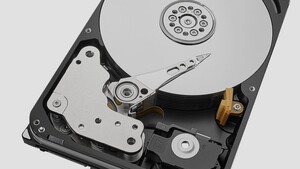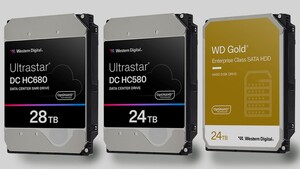@ # 16
nun ja .. defrag bringt bei ner SSD nichts.
dennoch kannste das laufen lassen.
dadurch geht se nicht kaputt.
und die meisten SSDs die sich schon nach kurzer zeit verabschiedet haben ..
sind zum großteil MLC .. die als OS SSD vergewaltigt wurden.
wenn ich nicht irre sind da die OCZ v1-v2 SSDs bekannt für.
desweiteren .. sicher lebst weder mit SSD noch mit einer HDD.
und jüngste ereignisse bzgl. seagate HDDs zeigen .. das auch hier noch so einiges in die hose gehen kann ;-)
denn die aktuell spekulierte rücklaufquote im falle seagate von 30-40% ...
sind mir bei SSDs noch nicht bekannt
und ob die nun 5-10-15 jahre hält .. interessiert mich da auch wenig.
denn das ist letztlich das gleiche wie mit OC von HW.
da interessiert es ja auch keinen ob durch OC die lebensdauer der CPU sich eventuell
auf erschreckende 10 jahre reduziert
@ weiter oben zu Win7 und SSD unterstützung
edit 26.1 .. ein interview mit intel bzgl. SSD gefunden
hier eine aussage zu WIN7 und anpassungen
Q. What file system is best to use with an SSD?
quelle http://enthusiast.hardocp.com/article.html?art=MTYxMSwyLCxoZW50aHVzaWFzdA==
"
A. Current file systems are pretty much equally unoptimized for SSDs. The computer industry has spent decades optimizing access patterns and file system layouts for traditional rotational magnetic media, and unfortunately SSDs change everything. Thankfully, an SSD is typically fast enough that it can behave as if it were a HDD without too much penalty. In the near future, I would like to see more focus on developing SSD-aware file systems, but it is going to require some openness from the SSD manufacturers. Microsoft is already working on SSD optimizations for Windows 7, which I find promising (link: http://download.microsoft.com/download/5/E/6/5E66B27B-988B-4F50-AF3A-C2FF1E62180F/COR-T558_WH08.pptx). I especially like the new ATA "trim" command, which is being leveraged to notify the drive when a sector is no longer in use, and that storage can be reclaimed by the SSD as additional spare area for wear leveling.
Someone asked about the SSD optimization mode in btrfs, so I should take a moment here to discuss it. It would seem that their SSD optimizations are more like HDD optimizations and are actually somewhat backwards for SSDs. I would like to have that discussion (elsewhere) with the developers, but I'm not really a file system expert so I might not be the right person for that job. Hopefully someone will straighten them out. I appreciate their efforts so far.
An easy thing you can do to optimize for SSDs if you are using Linux is to disable the kernel disk IO scheduler. SSDs don't have "heads" like HDDs do so the IO reordering (elevator algorithm) is useless and probably just slows things down. I suspect Microsoft will do something similar with the Windows 7 disk scheduler, although I didn't see any mention of it in that WinHEC presentation. They did mention that Windows 7 will disable automatic defragmentation for SSDs, which supports my claim that you should disable it manually if you are using XP or Vista."
angeblich hat oder wird MS die unerstützung von SSDs "optimieren".
in wie fern und in bezug auf welche anpassungen weiß ich auch nicht.
vermutlich siehts so aus, dass dann schon mal die oben genannten funktionen wie superfetch und prefetch einstellungen usw autom.angepasst werden - wenn Windows eine SSD erkennt.
ansonsten .. werden SSDs ohne probleme "erkannt" und "unterstützt".
lediglich kleinere anpassungen sollte man vornehmen.
nun ja .. defrag bringt bei ner SSD nichts.
dennoch kannste das laufen lassen.
dadurch geht se nicht kaputt.
und die meisten SSDs die sich schon nach kurzer zeit verabschiedet haben ..
sind zum großteil MLC .. die als OS SSD vergewaltigt wurden.
wenn ich nicht irre sind da die OCZ v1-v2 SSDs bekannt für.
desweiteren .. sicher lebst weder mit SSD noch mit einer HDD.
und jüngste ereignisse bzgl. seagate HDDs zeigen .. das auch hier noch so einiges in die hose gehen kann ;-)
denn die aktuell spekulierte rücklaufquote im falle seagate von 30-40% ...
sind mir bei SSDs noch nicht bekannt
und ob die nun 5-10-15 jahre hält .. interessiert mich da auch wenig.
denn das ist letztlich das gleiche wie mit OC von HW.
da interessiert es ja auch keinen ob durch OC die lebensdauer der CPU sich eventuell
auf erschreckende 10 jahre reduziert
@ weiter oben zu Win7 und SSD unterstützung
edit 26.1 .. ein interview mit intel bzgl. SSD gefunden
hier eine aussage zu WIN7 und anpassungen
Q. What file system is best to use with an SSD?
quelle http://enthusiast.hardocp.com/article.html?art=MTYxMSwyLCxoZW50aHVzaWFzdA==
"
A. Current file systems are pretty much equally unoptimized for SSDs. The computer industry has spent decades optimizing access patterns and file system layouts for traditional rotational magnetic media, and unfortunately SSDs change everything. Thankfully, an SSD is typically fast enough that it can behave as if it were a HDD without too much penalty. In the near future, I would like to see more focus on developing SSD-aware file systems, but it is going to require some openness from the SSD manufacturers. Microsoft is already working on SSD optimizations for Windows 7, which I find promising (link: http://download.microsoft.com/download/5/E/6/5E66B27B-988B-4F50-AF3A-C2FF1E62180F/COR-T558_WH08.pptx). I especially like the new ATA "trim" command, which is being leveraged to notify the drive when a sector is no longer in use, and that storage can be reclaimed by the SSD as additional spare area for wear leveling.
Someone asked about the SSD optimization mode in btrfs, so I should take a moment here to discuss it. It would seem that their SSD optimizations are more like HDD optimizations and are actually somewhat backwards for SSDs. I would like to have that discussion (elsewhere) with the developers, but I'm not really a file system expert so I might not be the right person for that job. Hopefully someone will straighten them out. I appreciate their efforts so far.
An easy thing you can do to optimize for SSDs if you are using Linux is to disable the kernel disk IO scheduler. SSDs don't have "heads" like HDDs do so the IO reordering (elevator algorithm) is useless and probably just slows things down. I suspect Microsoft will do something similar with the Windows 7 disk scheduler, although I didn't see any mention of it in that WinHEC presentation. They did mention that Windows 7 will disable automatic defragmentation for SSDs, which supports my claim that you should disable it manually if you are using XP or Vista."
angeblich hat oder wird MS die unerstützung von SSDs "optimieren".
in wie fern und in bezug auf welche anpassungen weiß ich auch nicht.
vermutlich siehts so aus, dass dann schon mal die oben genannten funktionen wie superfetch und prefetch einstellungen usw autom.angepasst werden - wenn Windows eine SSD erkennt.
ansonsten .. werden SSDs ohne probleme "erkannt" und "unterstützt".
lediglich kleinere anpassungen sollte man vornehmen.
Zuletzt bearbeitet:



